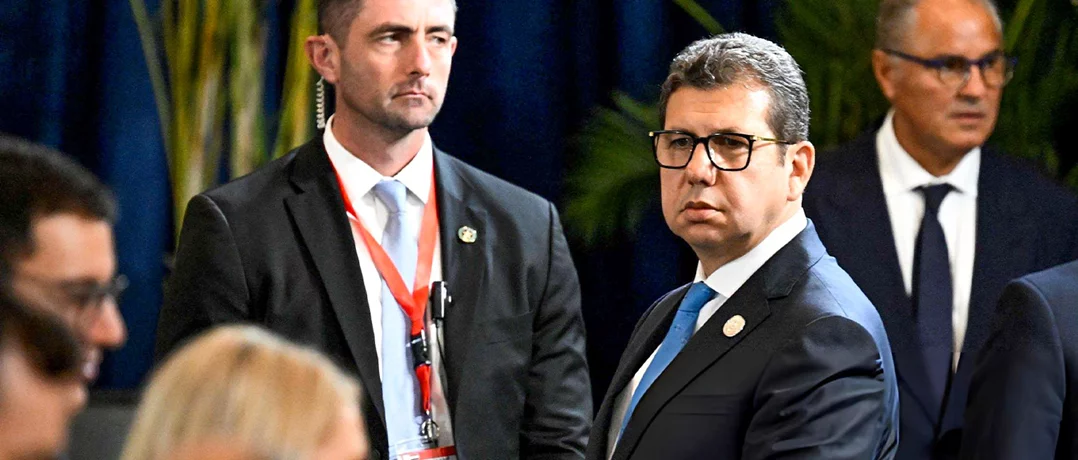Egypt strengthens its mediation role in Lebanon through high-level visits amid rising regional tensions and border threats.
Egyptian intelligence chief’s visit in the spotlight
Egyptian intelligence chief’s visit in the spotlight


Lebanon has received two remarkable visits at the beginning of this week.
The first includes a brief visit by A high-level Egyptian delegation, headed by the Director of Egyptian General Intelligence Hassan Rashad, who is overseeing the Gaza negotiations to ensure its durability. As for the second, it encompasses a visit by the Secretary-General of the Arab League Ahmed Aboul Gheit, who is scheduled to attend the opening of the 21st session of the Arab Media Forum, as well as the Regional Conference on International Judicial Cooperation in Combating Terrorism at the College of Command and Staff in the Lebanese Army. This renewed Egyptian diplomatic movement carries significant weight, which is in line with Cairo’s historical encounters with the Lebanese scene. Rashad’s visit, particularly, represents a critical event given his position as one of Egypt’s senior security figures and the message he is allegedly carrying to Lebanese officials and military authorities.
Egypt’s historical role with regards to Lebanon
Cairo’s diplomatic history in Lebanon has been shaped by times of tension and others of cooperation and constructive engagement.
The most significant phase in which Egypt exerted considerable influence on Beirut was in the 1950s. Back then, the rise of Egyptian President Gamal Abdel Nasser resulted in the emergence of Pan-Arabism in the Arab World, including Lebanon. Nasserite supporters were heavily impacted by Abdel Nasser’s charisma and vision, causing immense division within the Lebanese political landscape. As the brief 1958 crisis came to an end, Egypt played an important role in preserving Beirut’s “neutrality” during Lebanese President Fouad Chehab’s term, contributing to the country’s stabilization and prosperity.
Following Egypt’s peace agreement with Israel in 1979, its regional influence deteriorated, especially with the Arab boycott which lasted till 1988. Afterwards, Lebanon fell under Syrian occupation till 2005, where Damascus effectively controlled Lebanese internal and foreign affairs (rendering any meaningful diplomatic engagement with Lebanese authorities obsolete).
After Syria’s withdrawal, however, Egypt’s presence and influence began to increase, tackling various key Lebanese issues. For instance, it was part of the so-called “Quintet Committee” that was formed in 2023 to advance Lebanese presidential elections (after a vacuum that began since 2022). Additionally, it played an important role during the recent 2023-2024 Israel-Hezbollah confrontations, trying to achieve de-escalation and support Lebanon’s territorial integrity, safety, and stability.
Egypt’s diplomatic role in Lebanon stems from its mediation efforts. Due to its rich history, its regional standing, its ability to conduct discussions with Israelis and its pragmatic relations with Iran, Cairo has been awarded a suitable opportunity to act as a reliable mediator. Its experience in mediating conflicts between Hamas and Israel, as well, has also enhanced its ability in conducting mediation and negotiation efforts with regards to non-state actors and asymmetric warfare.
Who is Hassan Rashad?
In 2024, Egypt’s President Abdel Fattah al-Sisi named Major General Hassan Mahmoud Rashad as the Director of Egyptian General Intelligence, replacing the outgoing chief Abbas Kamel who became an advisor to the presidency. Rashad is a graduate of the Military Technical College in Cairo, a traditional training ground for leaders of the intelligence services. He previously served as Kamel’s deputy and was a longtime General Intelligence Service (GIS) officer, unlike his predecessor. His appointment coincided with the 2023 Gaza War as well as the Israeli military operation (including its ground offensive) against Hezbollah in Lebanon. The GIS, a powerful state agency in Egypt which deal with both domestic and foreign intelligence, has been a leading negotiator in such conflicts, with its chief reporting directly to the President.
The significance of Hassan Rashad’s visit to Lebanon
Hassan Rachad’s visit to Lebanon will convey crucial messages to Beirut. The latter entails a warning regarding the situation along the Lebanese-Israeli border as well as a support for the Lebanese government in its attempt to assert its sovereignty over its territory, in light of continuous Israeli violations and Hezbollah’s insistence on retaining its weapons. Rachad is also expected to call for practical measures to withdraw any Israeli pretext to prevent an imminent war, or to provide proposals to the Lebanese state to return to the path of the ceasefire agreement reached in November 2024.
This was confirmed by the Egyptian Ambassador to Lebanon, Alaa Moussa, after his meeting with the Lebanese President, General Joseph Aoun. He claimed that “the visit of the Egyptian Intelligence Director Hassan Rashad falls within the framework of security and political coordination with Lebanon,” confirming that “Egypt is making efforts to calm the situation.
Egypt is keen to prevent instability between the contending sides, especially due to its potential spillover and impact on the region. This is especially true with regards to Syria, Jordan and Gaza. The previous Gaza and Israel-Hezbollah wars have proven that events can escalate swiftly and uncontrollably, causing serious threats and danger for neighboring countries. Therefore, Cairo seeks to resolve the current tensions and achieve de-escalation.
Rashad’s visit comes just after one week after his discussions with Israeli Prime Minister Benjamin Netanyahu. It also coincides with rising tensions and alarms of a probable renewal of the previous war. The escalatory Israeli strikes against Hezbollah in Lebanon, which have intensified in intensity as well as proximity (reaching as far as the Bekaa and Baalbek regions), in addition to Tel Aviv’s notable 5-day military drill have signaled serious concerns regarding a looming confrontation should diplomatic efforts ultimately falter.


